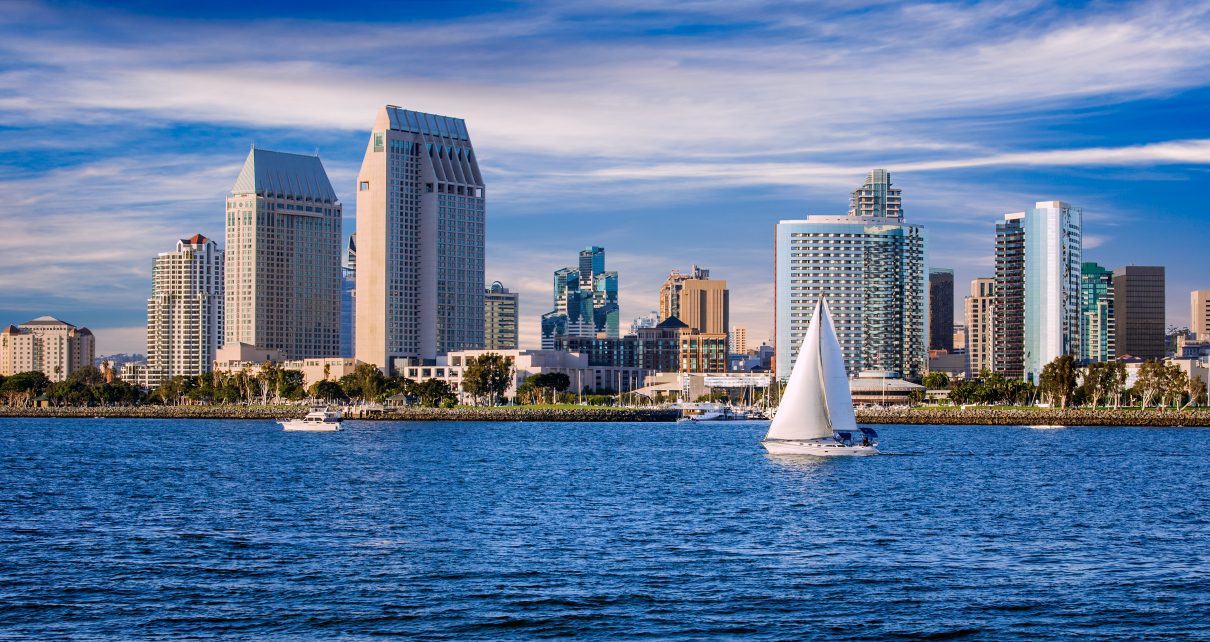
Downtown San Diego Sunset. (Photo: Dancestrokes/Shutterstock)
Roman Catholic Diocese Of San Diego Declares Bankruptcy
Diocese estimates that settlements could amount to more than $550 million
By Evan Symon, June 18, 2024 2:45 am
The Roman Catholic Diocese of Oakland filed for Chapter 11 bankruptcy on Monday because of 450 current claims for child sex abuse charges, becoming the latest to do so in California because of the high number of child sexual abuse lawsuits.
In the past ten years, the number of Roman Catholic Dioceses and Archdioceses declaring bankruptcy in the U.S. has gone up dramatically, with over a dozen declared in the past few years alone. California, with a large Catholic population, has seen its fair share of these bankruptcies.
The Catholic Diocese of Stockton was the first when it filed for Chapter 11 bankruptcy in 2014, and subsequently got out of it in 2017. In 2023, the Dioceses of Santa Rosa, Oakland, and San Francisco all filed. So far this year, only the Sacramento Diocese filed for bankruptcy, doing so in early April.
However, the San Diego Diocese has proved itself to be unique. Previously the Diocese declared bankruptcy in 2007, and last year, nearly did so again because of the sheer number of lawsuits. However, San Diego Diocese Cardinal Robert McElroy finally announced last week that they would be filing for bankruptcy yet again. On Monday, things were finalized when the Diocese officially filed.
“The diocese faces two compelling moral claims in approaching the settlement process: the need for just compensation for victims of sexual abuse and the need to continue the church’s mission of education, pastoral service and outreach to the poor and marginalized,” said Cardinal McElroy in a letter last week. “Bankruptcy offers the best pathway to achieve both. It is clear that as part of providing appropriate compensation to past victims of the sexual abuse of minors, both the parishes and high schools will have to contribute substantially to the ultimate settlement in order to bring finality to the liability they face.”
“The diocese must face the staggering legal costs in response to lawsuits alleging abuse dating back as far as 1945. May God never let this shame pass from our sight, and may God’s tenderness envelop the innocent children and teenagers who were victimized.”
The drastic rise in cases in San Diego and other Roman Catholic dioceses across California is due in large part to a 2019 California state law. AB 218, which was signed into law in 2019, specifically increased the time limit on childhood sexual assault cases to “22 years from the date the plaintiff attains the age of majority or within 5 years of the date the plaintiff discovers or reasonably should have discovered that the psychological injury or illness occurring after the age of majority was caused by sexual assault, whichever is later.” While the law ended at the end of 2022, many claims are still being processed, hence the quickly rising number of lawsuits.
San Diego Diocese declares bankruptcy for second time since 2007
In San Diego, that meant 450 new cases of child sex abuse. In 2007, during their first bankruptcy, the Diocese of San Diego faced only 144 lawsuits, which were settled for $198 million. However, with 450 potential cases that could lead to suits and settlements, the Diocese said that it would cost at least $550 million. Many of the recipients would also be older, as 60% of the cases date back to before 1974.
The Zalkin Law Firm, which represents the victims of the San Diego Diocese, said recently that the bankruptcy filings by dioceses were done to reduce compensation payouts and to not let the cases go to trial.
“It has become very clear that these Catholic Dioceses and their insurers have adopted a national strategy to use Chapter 11 bankruptcies to resolve child sexual abuse cases in a way that reduces the compensation paid to survivors and deprives survivors of their right to trial,” said Devin Storey of the firm.
In another statement, Irwin Zalkin, another lawyer for the firm, added that “It is our intention to continue our efforts on behalf of the 457 survivors who will now find themselves in bankruptcy court, to work with the diocese and its insurer to arrive at a fair settlement for these survivors. The ball is very much in the diocese and its insurance company’s court. If they really want to do justice, then they should pay what the fair value is for the harm that was done. That’s all we can do. We can’t give people their lives back, but we can hold accountable by the amount of money that they pay for the harm that’s been done. That’s the only thing we can do.”
However, much like the other Dioceses bankruptcies, Chapter 11 doesn’t mean that San Diego is out of the woods just yet.
“San Diego had been expected for some time,” said lawyer Mark Welsh, who has been a part of several Catholic Church lawsuits in 6 states, to the Globe on Monday. “But they have known this is coming for over a year. They got all their ducks in a row during this time. And thanks to seeing how others handled it, as well as their previous bankruptcy, they know how to handle it well. How do you think they knew the likely settlement figure and everything?
“But that doesn’t mean they won’t pay through the nose. What it means is that it is really going to complicate things, with victims now probably not getting as much as they hoped, and the chances for a big trial becoming a lot more slimmer. I means, they have some cases going back almost 80 years, so this is one that is going to be very rocky.”
More on San Diego’s bankruptcy is due to come out soon.
- Bill to Require Law Enforcement Disclosure if AI Was Used To Help Write Reports - August 7, 2025
- Gov. Newsom Files FOIA Request To ‘Expose True Cost’ Of L.A. Federal Troop Deployment for Anti-ICE Riots - August 6, 2025
- California Redistricting: How Newsom’s Plan Will Demolish Hard Fought GOP Gains - August 6, 2025




